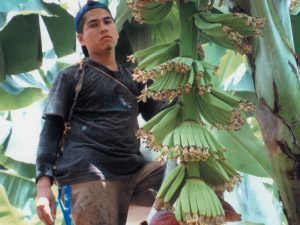Update: Something beautiful growing
by Betty Merten
This article was originally published in June 2007

(June 2007) — If you’ve eaten any bananas lately with the bright white and green GROW sticker on them, you know how good they are. With consistently excellent taste and texture, they never disappoint.
What you may not know is that they come from the coastal part of the state of Colima, Mexico, and that your purchase is helping to fund local community projects that benefit the children and families in the communities where these bananas are farmed.
Certified organic, GROW bananas are produced by Organics Unlimited, a small family-owned-and-operated business started by Mayra Velasquez de Leon, president, and her husband Manuel. The company began in 2000 and now markets all over the United States. “But our biggest markets, by far,” says Mayra, “are Washington and Oregon.”
Mayra grew up on a banana plantation and knows firsthand the challenges that workers face. She takes pride in the fair labor practices at Organics Unlimited and in her company’s commitment to improving the lives of the workers and their families.
In February 2005, Mayra and Manuel established GROW (Giving Resources and Opportunities to Workers), a private, nonprofit corporation dedicated to being socially responsible to its workers and to improving the lives of children in these very poor, agricultural communities. By charging a small additional fee for each box of bananas (which PCC to date has not passed on to consumers), Organics Unlimited raises the funds necessary to make GROW’s vision a reality.
In its first year of operation, GROW contributed $25,000 to the International Community Foundation, which, in turn, used the funds to develop educational and social programs in the banana-growing communities in Colima. Foremost among these was setting up a homework club for children in Cerro de Ortega, a banana-growing region.
To help develop the homework club, GROW chose to utilize the expertise of Ted Rose and Susan Hill at Project Amigo, a nonprofit with experience running successful programs in other parts of Mexico. They set up a small pilot program where interested junior and senior high school students could meet with a tutor to help them with academic and leadership skills. They wanted to see what, if any, impact this special intervention would have on the attitudes and grades of the students.
“It was a smashing success,” says Hill. “These kids are excellent students who want to make a difference in their communities.” The program was continued through 2007 and currently serves 25 students who are poor, demonstrate a desire to further their education, and have a willingness to do social service.
In its first year, GROW also provided a university scholarship to an engineering student, contributed to Project Amigo’s College Endowment Fund and helped support Casa Amigo, a residence for college students attending the University of Colima from more distant parts of the state. Casa Amigo is now home to 11 women and three men who are studying at the university.
And GROW is still growing. It has expanded its support of the homework clubs in Cerro de Ortega, the College Endowment Fund and Casa Amiga, and has added a second university scholarship for a total contribution of $36,000 in its second year. In addition, GROW is funding Casa Socorito, a day care center in Cerro de Ortega for the mainly female workers at the banana-packing plant.
“Women are the best banana packers, and they tend to have young children,” explains Mayra. “The day care center was going to have to close for a lack of funds, but they came and asked us for help. We’re very happy that we could help keep it going.” She says that GROW would like to find a place to purchase for Casa Socorito so it could be in a better and more permanent facility. “We’re also looking at other opportunities where we can help,” she adds.
According to Ted Rose, GROW and Project Amigo are actively talking about providing additional services in the Cerro de Ortega area similar to those currently offered by Project Amigo elsewhere. “These may include vision and dental clinics and additional scholarships as funding permits,” says Rose.
For its part, PCC is committed to purchasing all of the GROW bananas it can. “It’s a win-win for everyone” says PCC Produce Merchandiser Joe Hardiman. “Not only do we get excellent bananas, but we’re also helping to make the communities better where the bananas are grown.”
From a day care center to college scholarships, GROW is making a difference — and PCC is building social equity into our food system, one box of bananas at a time.
